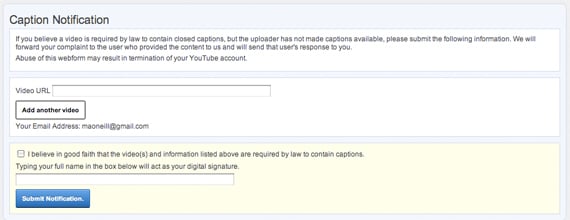YouTube Asking Customers To “Blow Whistle” When Publishers Fail To Show Closed Captions

Abusing the form comes with the following warning:
?Abuse of this webform may result in termination of your YouTube account.?
To keep everything above board YouTube requires a digital signature with each form submitted. The signature proceeding the following statement:
?I believe in good faith that the video(s) and information listed above are required by law to contain captions.?
When released for full compliance in August Amazon, YouTube and various other members of the Digital Media Association (DiMA) asked for an extension because ?the current September 30, 2012 deadline is unrealistic due to technical difficulties.? ?The extension was not granted.
The new feature arrives just one week after YouTube began allowing users to fight copyright claims made against them, a huge step for user rights on the world’s largest social video sharing platform.


Publishers should definitely be responsible for making their content accessible. Nowadays, captioning can easily be done by outsourcing to a captioning service, such as DirectCaption.com, which costs only about $1 per minute for fast and accurate captions.
Video producers should not be in a hurry to pay bottom dollar for closed captions. Many nonprofit video producers spend lavishly on soundtracks, voice-overs, and cinematography. Captioning should be treated as just another production value, to be taken just as seriously, not simply handed off to the lowest bidder. After all, the access of an entire 10-million-strong demographic (in America alone) depends on accurate closed captioning. Besides, the best captioners don’t merely transcribe text: they pace it advisedly and use logical line breaks and speaker IDs. They are conversant with terminology in a wide variety of niche areas: everything from molecular science to Cockney slang. The best captioners are also conversant in captioning for television as well as Internet and are ready to export a wide variety of caption formats to suit both platforms. A good caption company will also be on-call to handle last minute requests. This becomes especially important in 2017 in the U.S. when “near-live” television programming must be captioned within 8 to 12 hours of being aired on television with captions.